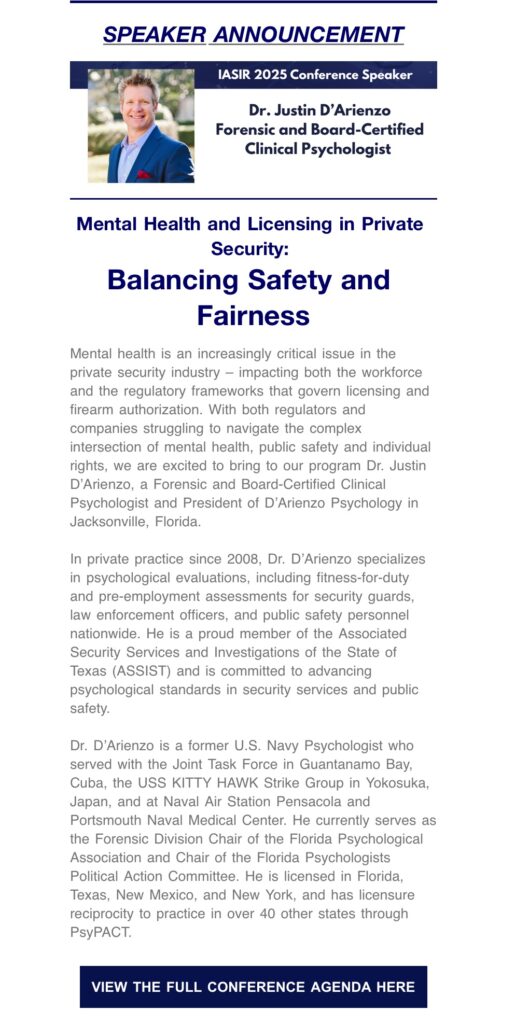- HOME
- PSYCH SERVICES
- BUSINESS & PERFORMANCE PSYCHOLOGY
- CLINICAL, COUPLES, & FAMILIES
- ADHD Treatment & Evaluation Services
- Anger Management
- Anxiety Treatment & Evaluation Services
- Borderline Personality Treatment Services
- Cognitive Behavioral Therapy (CBT) Self-Help
- Couples Counseling and Marital Therapy
- Consent for Psychological Services for Minors Post-Divorce
- Depression Treatment Services
- Infidelity Recovery
- Jacksonville Counseling and Psychology
- Military Psychology & Tricare
- Narcissistic Personality Treatment Services
- Online Counseling
- Psychoeducational Testing
- Psychological Testing and Assessment
- Psychotherapy & Counseling
- FORENSIC PSYCHOLOGY & EXPERT TESTIMONY
- LIFE COACHING & EXECUTIVE COACHING
- PSYCHOLOGICAL PUBLIC DISABILITY QUESTIONNAIRES (DBQ)
- ONLINE COURSES
- Our Partnership Begins When You Purchase an Online Course
- Get to Know Dr. D’Arienzo, Relationship Expert
- Florida Premarital Preparation Online Course
- Georgia Premarital Education Online Course
- TwogetherinTexas Premarital Online Course
- Tennessee Premarital Preparation Online Course
- Minnesota Premarital Education Course Online
- Oklahoma Premarital Counseling Online Course
- South Carolina Premarital Preparation Course
- West Virginia Premarital Education Course
- Online Marriage and Relationship Tune Up Course
- Florida DCF Certified Parent Education and Family Stabilization Online Course
- Georgia Qualified Parent Education and Family Stabilization Online Course
- Texas Qualified Parent Education and Family Stabilization Online Course
- High Conflict Co-Parenting Online Certificate Course (8 Hours)
- Online Anger Management Four Hour Course (Level 1)
- Online Anger Management Eight Hour Course (Level 2)
- Sexual Harassment Online Training
- MMPI/GUARD/LEO
- CPI Police and Public Safety Assessment
- G License Psychological Testing
- Online Psychological Testing for Armed Security Guards and Personal Protection Officers
- MMPI Texas Level III CSO and IV PPO Psychological (ONLINE)
- Requirement for Texas Security License Applicants: MMPI Evaluation
- Level 3 Security Guard New Mexico Online MMPI Psychological Evaluation
- TEAM
- SOCIAL MEDIA/BOOKS
Setting the Standard
Posted by: Dr. Justin D'Arienzo, Psy.D., ABPP
Setting the Standard: Dr. Justin D’Arienzo Speaks at IASIR on Psychological Testing for Armed Security Personnel
Press Release: This week, Dr. Justin D’Arienzo, Board-Certified Clinical and Forensic Psychologist, presented at the International Association of Security and Investigative Regulators (IASIR) 2025 Convention in Kansas City, Missouri, on a topic vital to public safety and industry accountability: Best Practices in Psychological Testing for Armed Security Personnel. He presented to both U.S. and Canadian regulators, security firms CEO’s and investigative company owners.

Drawing on over 5,000 psychological evaluations of armed private security officers nationwide, Dr. D’Arienzo emphasized that the industry continues to operate in what he calls the “Wild West”, with no national standard, no established testing norms for armed security officer, and inconsistent regulations across states. This inconsistency creates risk for companies, regulators, and the public alike, contributing to liability, turnover, and “doctor-shopping” among applicants.

Creating the Industry Standard: Three Pillars of Psychological Assessment for Armed Guards
Dr. D’Arienzo proposed a unified, research-driven model built on three core pillars:
- Validity: Ensuring assessments accurately and effectively measure both psychological stability and suitability.
- Accountability: Requiring that psychologists are conducting evaluations using a standard methodology, reporting accurate information, reporting disqualifying candidates, and maintaining records.
- Affordability: Balancing rigorous evaluation with accessible implementation for agencies and candidates while still following the standard yet modifying it so it is practical and affordable.
He referenced the California POST Psychological Screening Manual (2022), APA’s 2017 Professional Practice Guidelines for Occupationally Mandated Psychological Evaluations, and International Association of Police Chiefs: Preemployment Psychological Evaluation Guidelines (2020 Revisions) as guiding document in developing the gold standard for armed security guard evaluations and calling for their adaptation to the private sector to ensure evaluations are standardized, defensible, and compliant with ADA and EEOC law.
The Dual Component Evaluation Model
Dr. D’Arienzo outlined his model for evaluating armed security personnel to include:
- Stability (Psychological Fitness) Assessment: Measured and evaluated through validated tools such as the MMPI-3 or PAI to assess psychological and emotional functioning through a test and in-person or virtual interview to determine if psychopathology is present and whether it would interfere with serving as an armed officer.
- Suitability (POST Personality Dimensions/Normal Personality Traits) Assessment: Ideally psychological suitability would be assessed using instruments like the CPI or MPQ, focusing on judgment, impulse control, teamwork, and integrity. Although using an objective instrument is ideal, if cost is an issue, this component may be conducted by interview alone.
This dual component approach mirrors best practices in law enforcement (POST) but is adapted for the realities of private security, an environment where officers may operate under the color of law without full police authority.
Establishing Armed Security Guard MMPI-3 Norms
Dr. D’Arienzo shared his preliminary armed security guard data after evaluating nearly 5,000 armed guards specifically with the MMPI-3 and compared this to the Pearson’s MMPI-3 police officer norms. He found similar average T-scores but with less range restriction found in police officer norms. He shared about his continuing research and need for feedback from guard companies regarding retention and performance of guards already tested to assist the field in better predicting who will more likely be a successful armed guard.
Balancing Safety and Fairness
Dr. D’Arienzo underscored the challenge regulators face such as maintaining public safety while preserving fairness and opportunity for candidates. He advocated for a three-tiered outcome system “pass,” “reservations,” or “fail” if the psychologist is working in coordination with an agency, but to offer a traditional pass/fail model if the individual is self-pay and the letter or certification form is being submitted to the state.
He also highlighted that psychological evaluations not only protect the public but also offer legal defense for agencies against negligent-hiring claims, ultimately improving confidence and professionalism in the security industry.
A Call for National Consistency
States like Texas, Florida, New Mexico, Oklahoma, Pennsylvania, and California have made strides toward standardizing the examining procedure, yet most remain fragmented, insufficient, and inconsistent across those states. Dr. D’Arienzo called upon IASIR regulators and industry leaders to work together toward a shared framework, one that elevates the profession, reduces liability, and strengthens public trust.
“We have a duty to protect the public and those who serve it,” Dr. D’Arienzo concluded. “By adopting a unified, evidence-based standard, we can improve safety, fairness, and confidence across the entire armed security industry.”
About Dr. Justin D’Arienzo: Dr. Justin D’Arienzo is a Board-Certified Clinical and Forensic Psychologist and former U.S. Navy psychologist with over two decades of experience evaluating and treating law enforcement and security professionals. He leads D’Arienzo Psychology in Jacksonville, Florida, and provides psychological services nationwide for public safety, legal, and corporate organizations.




